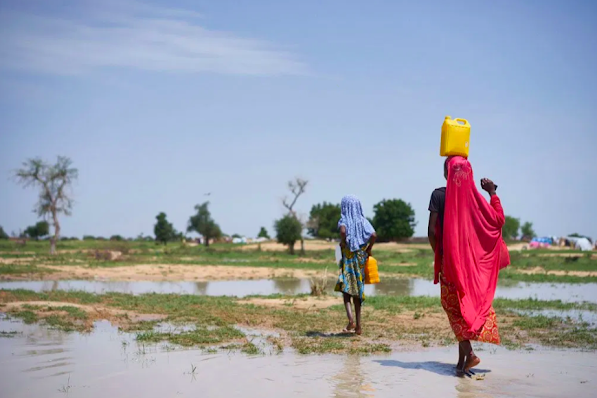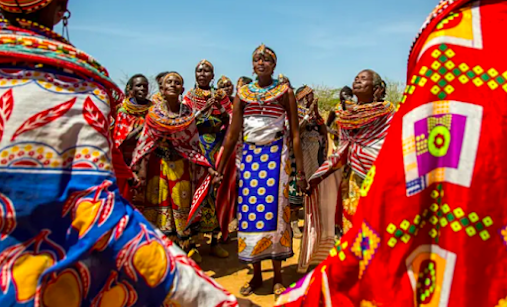1 - Introduction
'The 200 million hours women and girls spend every day collecting water is a colossal waste of their valuable time' (UNICEF, 2016).
This bold and startling figure was the first piece of information I came across when researching “gender and water in Africa”. The headline clearly alludes that there is a predominant relationship between women and water, and one I am eager to analyse further within the context of Africa. It sparked a number of questions as I tried to comprehend the weight of such a statistic; questions that I hope to answer in this blog.
A woman and a young girl carrying water in Diffa, Niger: (UN, 2016)
The background – 400 years of colonialism and exploitation
While I introduce my take on ‘Water and Development in Africa’, I should highlight Europe’s contributions toward the socio-political development issues that Africa suffers today. Walter Rodney’s 1973 book, “How Europe Underdeveloped Africa”, is relevant in explaining the colossal impact that colonisation and the trans-Atlantic slave trade had on the continent. He illustrates how the removal of millions of able-bodied men and women had detrimental impacts on the agricultural and economic systems that we critique today. ‘"What would have been Britain's level of development had millions of [Britons] been put to work as slaves outside of their homelands over a period of four centuries?"’, Rodney asks. It is important to remember this question when making potentially patronising commentaries on African development.
Source: (Instagram, 2020)
Ignorant portrayals of Africa
I also take seriously the ignorant portrayals that can arise when writing about Africa, and I plan to make sure that my blog does not fall into this category. Wainaina (2019) explains that one should ‘treat Africa as if it were one country’, making sure to mention the ‘naked warriors, loyal servants’, and ‘ancient wise men living in hermitic splendour’. He does this in a similarly satirical fashion to the 1988 film ‘Coming to America’ starring Eddie Murphy, an African prince who escapes his fantastical kingdom and arranged marriage in search for a wife he can choose himself in New York. I will not be writing about Africa in such a way…
Why Africa?
Africa is home to 54 countries, 1.2 billion people, and between 1500-2000 spoken languages. It would be strongly inaccurate for my blog to generalise the vast and diverse continent as one homogenous entity ridden with water scarcity. In fact, Africa holds 9% of global freshwater reserves, and 0.66 million km3 of groundwater, albeit unevenly distributed (Gaye and Tindimugaya, 2019). However, less than 50% of those living in rural Africa have access to ‘both improved drinking water and sanitation’ (Nalik, 2016), and over 430 million people in Africa still live in extreme poverty (World Bank 2017), indicating issues of accessibility rather than scarcity. The continent has therefore become a critical focus of global development agendas such as the 2016 UN Sustainable Development Goals (SDGs), particularly where a safe and clean water supply is concerned. SDGs 5 (achieving gender equality) and 6 (available and sustainable water supplies) express the importance of looking specifically at gender in our analyses of water and development in Africa.
Target 5.4: By 2030, recognize and value unpaid care and domestic work through the provision of public services, infrastructure and social protection policies and the promotion of shared responsibility within the household and the family as nationally appropriate.
Target 6.2: By 2030, achieve access to adequate and equitable sanitation and hygiene for all and end open defecation, paying special attention to the needs of women and girls and those in vulnerable situations.
The importance of ‘equitable’ water access can be assessed alongside the unequal responsibilities that women face in water collection as a result of lacking public service provision. The above targets show how there is often co-dependency across the SDGs, and that to achieve both goals 5 and 6, we must also prioritise issues concerning gender.
To conclude:
As my blog comes into fruition, I hope to gain a well-rounded understanding of some of the complex issues surrounding water and development in Africa. I have chosen to focus specifically on gender as there is clearly a prevalent relationship between women and water, and I want to explore it further throughout the course of this blog. In my next post, I will be examining in more detail the 200 million daily hours that women and girls spend fetching water, and the resultant 'time poverty' that it can cause (Costa et. al. 2009).
To anyone reading this post, I welcome you to my blog, and please don’t hesitate to leave comments down below!




Really interesting first post Heather, I am interested to see what parts of the feminisation of water that you bring into this discussion. I really like the different sources in referring to why we should not homogenise Africa. Can't wait to see more!
ReplyDeleteThank you Sophia!
DeleteReally interesting starting point for your blog! I really like the way that you have set out the issues, context and significance of the topics you plan to cover.
ReplyDelete(GEOG0036 PGTA)
Just to add, include links to your references using hyperlinks. See FAQs (task 1.1.) on the Moodle page. Also, I would not recommend Instagram as a credible resource - try to find the original source.
DeleteThank you for the feedback! I will try and find the original, although I think the instagram version is the only one that exists
DeleteIt starts well ! Looking forward to read more !
ReplyDeleteThank you!
DeleteThis is a really interesting, detailed and insightful introduction to your blog. You do an amazing job not only saying why Africa is a challenging place. By starting with a quote you easily grabbed my attention and had me asking for more. I love that suggest why this topic means a lot to you and why it is so important to study. To make this perfect, it would be great if you could give a route map of the following blog posts so we know what to expect. Apart from that, this is a well-written, detailed and fascinating blog post. I can't wait to read the rest!
ReplyDeleteI agree with Nasir. i think you have set out your blog in a very interesting way, that is clear and detailed and i liked your use of imagery to support your points.
DeleteThank you Nasir and Maha! I appreciate your comments and will look into making amendments.
Delete